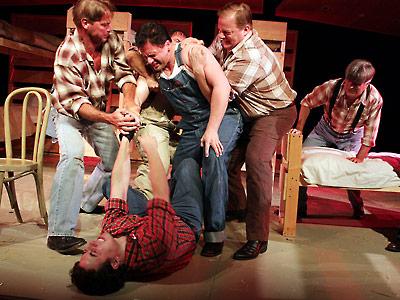Taking on ‘Mice and Men’

“Of Mice and Men,” a theater masterpiece by John Steinbeck — the Nobel Prize-winning writer who wended his way from Northern California eventually to make his home in Sag Harbor — opened last Thursday at the Levitas Center for the Arts at the Southampton Cultural Center.
This seminal work, set against the backdrop of post-Depression-era California, tells the now archetypal tale of two transient workers, George and Lennie: George, the small, quick-thinking one, and Lennie, with the mind of a child and the physical strength that both helps and hinders his every move.
From the first scene, with the rabbits and the dead mouse, to the last, set in the same place by the riverbank, “Of Mice and Men” is so deeply ingrained in our collective American theater consciousness that it has become almost intrinsic. Even if an audience member has never seen a production before, or read the book, there will be that sense of familiarity, of déja vu.
Michael Disher’s production in Southampton offers a set made up entirely of burlap and wooden pallets — reminiscent of the old fruit crates shipped from California in the years following the Great Depression — minimal and effective.
Seth Hendricks’s performance as Lennie is layered with the subtleties of a man trying to do the best he can, the hapless victim of a brain that won’t always obey him. It is easy to play Lennie as just a big, dumb galumph, but Mr. Hendricks avoids that trap and makes him endearing. Joe Pallister’s portrayal of George was a little less focused on opening night, but still he captured the essence of the character: For all his complaining about Lennie and his faults, George’s humanity, and happiness, only shines through when he is describing the future world he has created for Lennie and himself.
When, because of Candy (a moving performance by Billy Paterson), another worker on the farm, George’s dream suddenly becomes plausible, the play then continues smoothly to its natural conclusion.
Curley’s wife, played by Bonnie Grice, is the spanner in the works to obtaining that dream. Lennie likes soft things in this world of hard work and hard bunks. George can tell from the beginning that there will be trouble afoot.
Although the book and script for “Of Mice and Men” describe Curley’s wife (unnamed like so many women in the Bible) as heavily made up and flirtatious, she is not the tart that the workers describe. Another isolated soul, stuck on a farm, married to a man she barely knows and with no one to talk to, she is just another traveler on the lonely road, with a dream of her own.
Loneliness and hope are the themes of Mr. Steinbeck’s work, and nowhere do they play out more obviously than with Crooks, the “negra” stable boy (Eugene Hamilton). Here is a man who has accepted his fate as an untouchable, relinquished to a secluded bunk next to the manure pile, who, in his fellow outcast, Lennie, finds a kindred spirit and a chance to dream again. Crooks’s transition from anger to suspicion to trust to excitement in his room is one of the high points of the production.
“A guy gets too lonely, he gets sick,” Crooks tells Lennie. This is a world of searing solitude, where to have even a toothless, smelly dog — as Candy does — or a trusting simpleton as a companion is infinitely preferable to the alternative of the affection and comfort of a prostitute for a scant few minutes on a Saturday night.
“Everyone in the whole damn world is scared of each other,” says another farmhand, Slim.
“But we’re not like everybody else,” George repeats in the yarn he spins for Lennie, over and over again — they have each other.
However, as the Scottish poet Robert Burns foretold in his ode “To A Mouse,” “The best-laid schemes/O’ Mice and Men/Gang aft a-gley.” Or, in a more modern tongue, “The best-laid plans of mice and men often go astray.”
Mr. Disher’s recent productions at the Southampton Cultural Center have been intent on celebrating the American worker, and no historical piece does that more powerfully, and touchingly, than “Of Mice and Men.” It is an important work, and we are lucky indeed to have a community theater that is willing to take it on.
“Of Mice and Men” will be performed this evening through Saturday at 8 p.m., and on Sunday at 2:30 p.m. The Levitas Center for the Arts is at 25 Pond Lane in Southampton.
